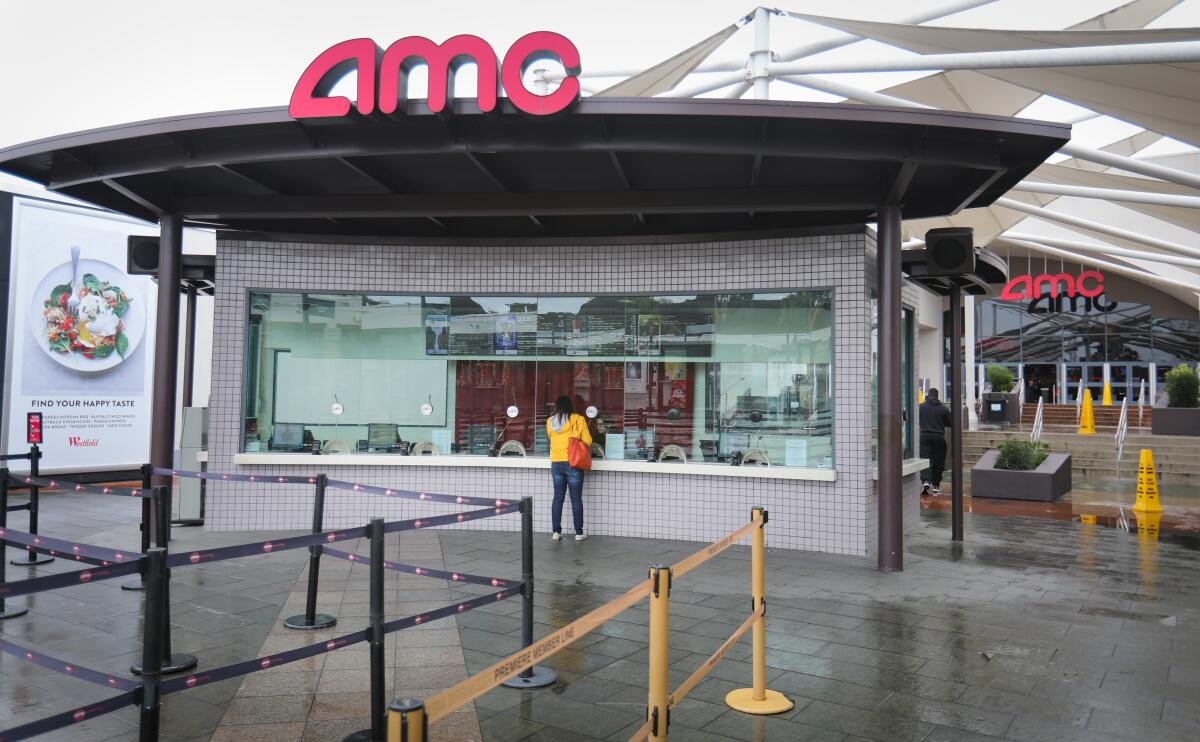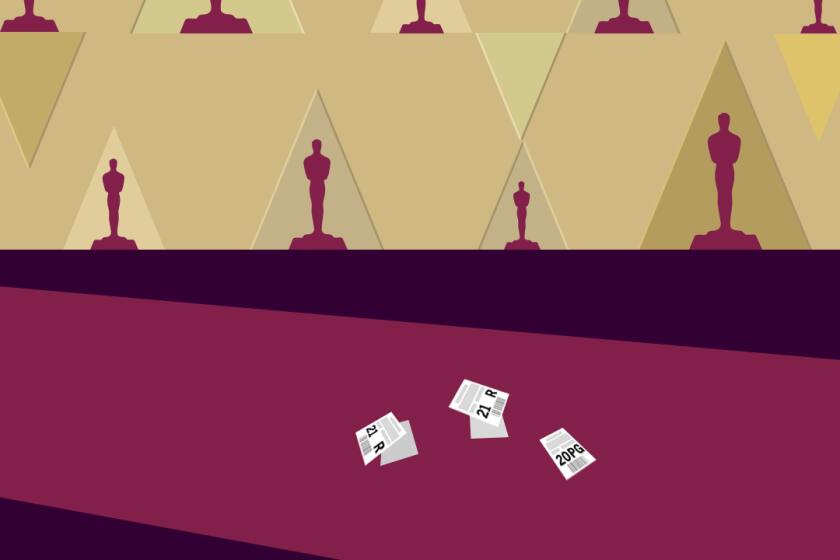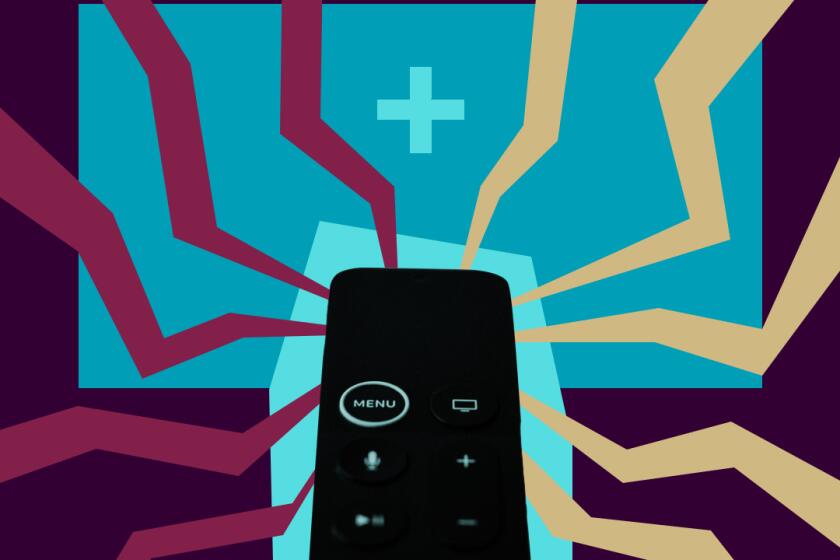‘The big screen is back.’ As Hollywood reopens, studios look to lure moviegoers back

- Share via
Appearing Wednesday morning in an AMC Century City 15 auditorium in Los Angeles, former California Gov. Arnold Schwarzenegger tried to lead an audience of several dozen studio executives, publicists, journalists and exhibition leaders in a rallying cry.
“We are back! We are back!”
The 73-year-old “Terminator” star was among a multitude of Hollywood leaders who gathered in an auditorium at the multiplex to rally around the nation’s movie theaters after 14 months in which the movie industry was dominated by streaming, theater closures and release delays caused by the COVID-19 pandemic.
“I wouldn’t be here if it weren’t for the theaters,” Schwarzenegger said. “You need the big screen, because if you have a movie and you don’t have the theaters, you have nothing.”
Hollywood and thousands of U.S. movie theaters hope he’s right.
During a three-hour event, 13 movie studios — including major studios such as Disney and Universal Pictures and independent distributors Neon and A24 — presented clips and trailers for upcoming summer movies. They touted blockbuster franchise flicks such as “F9,” “Black Widow” and “A Quiet Place Part II.” Prestigious independent fare, such as Questlove’s Harlem music documentary “Summer of Soul,” also got their due.
Inside the business of entertainment
The Wide Shot brings you news, analysis and insights on everything from streaming wars to production — and what it all means for the future.
You may occasionally receive promotional content from the Los Angeles Times.
Many of the trailers and clips included taped testimonials from stars and filmmakers about the importance of the movie theaters. Stars like Dwayne Johnson (Disney’s “Jungle Cruise”) and Ryan Reynolds (Fox’s “Free Guy”) offered paeans to the big screen. Warner Bros. showcased an eight-minute scene from its adaptation of Lin-Manuel Miranda’s “In the Heights,” accompanied by a taped introduction from director Jon M. Chu recalling the joys of seeing “E.T” and “The Joy Luck Club” in theaters.
Just about every filmmaker and star who spoke in a recorded message made the case that their movie was meant to be seen in theaters. Marvel Studios’ sizzle reel featured a clip of audience members losing their minds during a key scene of “Avengers: Endgame.” “There is nothing like seeing a movie on the big screen,” said Jennifer Hudson, who was promoting the Aretha Franklin biopic “Respect.”
The event was the biggest move yet by Hollywood studios to publicly support theaters as they try to recover from the darkest period in their history. It was part of a broader initiative, dubbed “The Big Screen Is Back,” which kicked off in April with a P.S.A. that aired during the Oscars preshow on ABC, featuring Matthew McConaughey and sound bites from theater ushers and concession workers.
Few industries could use a pep rally more than movie theaters.
In New York and Los Angeles, the nation’s two largest movie markets, the box office was shuttered for a year. Some midsize chains, including Austin-based fan favorite Alamo Drafthouse, filed for Chapter 11 bankruptcy protection. ArcLight Cinemas and Pacific Theatres recently announced they wouldn’t reopen their doors. AMC has teetered on the edge of bankruptcy multiple times throughout the pandemic.
Small operators are still waiting for relief from the federal government’s $16-billion Shuttered Venue Operator Grant program, which stumbled badly out of the gate last month.
But with new movies finally coming out and Americans’ comfort levels of going out increasing, the industry is hoping to set the stage for a comeback. Legendary and Warner Bros.’ “Godzilla vs. Kong” recently set a pandemic record in the U.S. and Canada by grossing $95 million domestically, even though it debuted simultaneously on HBO Max.
According to research firm NRG, 70% of U.S. moviegoers are now comfortable going back to theaters, up from 45% from the beginning of the year.
Other than Frances McDormand, was anyone in Hollywood interested in standing up for movie theaters in their hour of need?
“Just being back in a theater again feels so powerfully good,” said J.J. Abrams, one of the few household names who showed up in person. “A lot’s been said about the ‘Roaring 20s’ after the pandemic of 1918, and I think that it’s an apt analogy. I think there’s going to be a hunger to live again.”
The Century City event served as a reunion of sorts, and it occasionally got emotional. Some executives noted that this was the first time they’d been in a commercial theater since the public health crisis took hold in March 2020. Focus Features domestic distribution president Lisa Bunnell got choked up when talking about the power of the theatrical experience with a crowd.
“It’s important to have that human connection,” she said. “Without that, why make movies?”
Theater executives have privately groused that the major movie studios and celebrities haven’t done more to cheer on the recovery of the traditional cinema.
During the 93rd Academy Awards, only “Nomadland” star Frances McDormand used the winners’ stage to make a plea for people to see the nominated movies on the biggest screen possible, sitting shoulder to shoulder.
Most of the major studios are owned by media companies that have made streaming services their priority. The land grab for subscribers has caused massive upheaval in the industry. This week, AT&T said it would spin off Warner Bros. parent WarnerMedia to merge it with Discovery, setting the stage for a combined streaming super giant. Amazon is in talks to acquire “James Bond” studio MGM, according to people familiar with the matter, though it’s not clear a deal will happen.
If WarnerMedia can’t compete on its own, what does that say for the other players? Do NBCUniversal and ViacomCBS get together?
Jason Blum, producer of “Get Out” and “Blackkklansman,” acknowledged that the industry is in the midst of a major transition.
“At the moment, our world feels like it’s kind of at this inflection point, and also our industry is at an inflection point — the collision of the recovery from the pandemic and the shifting business models,” he said. “But if you told me right now that you were going to turn down the lights and show me any of the movies that were previewed today, I would stay.”
More to Read
Inside the business of entertainment
The Wide Shot brings you news, analysis and insights on everything from streaming wars to production — and what it all means for the future.
You may occasionally receive promotional content from the Los Angeles Times.













